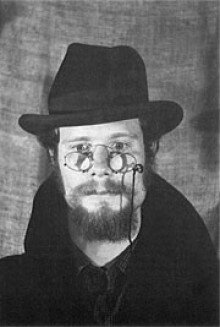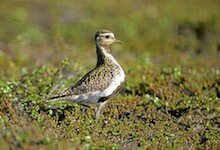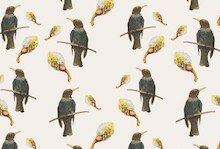
Yair Hurwitz was born in Tel Aviv in 1941. He died in 1988 at the tragically early age of 47, of the heart disease that had plagued him from childhood, while lying in a Belgian hospital waiting for a heart transplant. Hurwitz’s whole life, in fact was shadowed by tragedy: his mother’s entire family was murdered in the Holocaust; his father died when the poet was only eight years old. With a personal background such as this, one would expect poetry of brooding and sorrow. But what Hurwitz wrote was just the opposite, revealing his tremendous love of nature, the gracefulness of his lyric energy, the humor, even tenderness with which he contemplates his fear of death, and the meaning itself of death.
He is especially difficult to translate, because, like Yehuda Amichai, his language is embedded in the language of prayer, which he simultaneously evokes and repudiates. One section of a poem about his father’s death, for example, is called ‘The Terrible One’ (hanorah in Hebrew), which for the Hebrew reader calls up a prayer recited on Yom Kippur, the Day of Atonement, and invokes the great, mighty, and awesome God. Here the word norah is used in the biblical sense of awe-inspiring. In the body of the poem he uses the term again in its ordinary spoken sense of terrible. The irony is not bitter, however; it hovers tenderly around the child’s understanding. Hurwitz was already using contemporary style: a mixture of registers and ironic humour.
His humour did not desert him even when he was hospitalised and hanging on to life by a thread. “They moved my bed into a room,” he writes, “and I became a nightmare in someone else’s dream.” Further on he describes his conversation with the doctors:
“And what about women?” I asked.
One of the top specialists replied: “As usual”.
The second, no less senior: “With restraint”.
The third, he, too, one of the big ones: “Become chaste”.
Now, when I’ve lost all opportunities
I know that medical science is as exact,
approximately, as literary science.
Another example of this humour even under the most extreme circumstances is his use of the word ‘fluttering’ (in Hebrew pirpur) in the title of one of his late poems, ‘Fluttering Corridors’, which he dedicated to his cardiologists. In Hebrew, the word pirpur denotes several different things: the rapid movement of a bird’s wings, or the movement of the wings of a butterfly or moth, and, in medical language, palpitations of the heart. Atrial fibrillation, one of the heart diseases that afflicted Hurwitz, is in Hebrew pipurei lev (fluttering of the heart).
This poem, contained in a book called Tsipur cluah (Captive Bird), brings to mind an idiomatic Hebrew phrase joining the image of a bird (a traditional metaphor for the poet) to that of the self or soul, tsipur hanefesh (literally, “bird of my soul”) – a phrase has come to mean anything held dear. Hurwitz in a sense takes this expression and deconstructs it, turning it into an extended metaphor: his conversations with this bird as he moves towards death.
There can be no more convincing proof of the greatness of his poetry than the fact that a group of his contemporaries joined to edit and publish his Collected Poems in 2008, on the twentieth anniversary of his death.
Lois Bar-Yaacov was for many years lecturer in American and English poetry in the English department of the Hebrew University of Jerusalem.
Bibliography
Berehovot alamim, Aked, Tel Aviv, 1961
Shirim min hakatzeh hanamukh, Manno Shir, Tel Aviv, 1962
Shirim le-louise, Achshav, Jerusalem, 1963
Salvion, Achshav, Jerusalem, 1966
Beir shrakiim las ain margua mikhseh, Gog, Tel Aviv, 1968
Narkissim lemalkut medemna, Sifrut Poalim, Tel Aviv, 1971
Onat hamakshafa, Daga, Tel Aviv, 1971
Shirim 1960–1973, Sifray Siman Kria, Tel Aviv, 1973
Beshavti lavadi, Tel Aviv, Sifray Siman Kria, 1975
Makom, Hkibbutz Hameuchad, Tel Aviv, 1978
Prakim mesefer hahalom, Sifray Siman Kria, Tel Aviv, 1978
Anatomia shel geshem, Hakibbutz Hameuchad, Tel Aviv, 1980
Yalkut leyedidim, Jerusalem, [limited edition of 100 copies], 1980
Eretz bekhira, shirim 1961–1981, Hakibbutz Hameuchad, Tel Aviv, 1982
Yakhasim vehda’aga, Hakibbutz Hameuchad, Tel Aviv, 1986
Tsipur cluah, Tel Aviv, Hakibbutz Hameuchad, 1987
Goral hagan,Hakibbutz Hameuchad, Tel Aviv, 1989
Kol hashirim, Hakibbutz Hameuchad & Sifray Siman Kria, Bnai Brak, 2008
Link
Complete Hebrew Bibliography Works by and about Yair Hurwitz in books, journals, newspapers, etc.
Sponsored by POETRY PLACE







